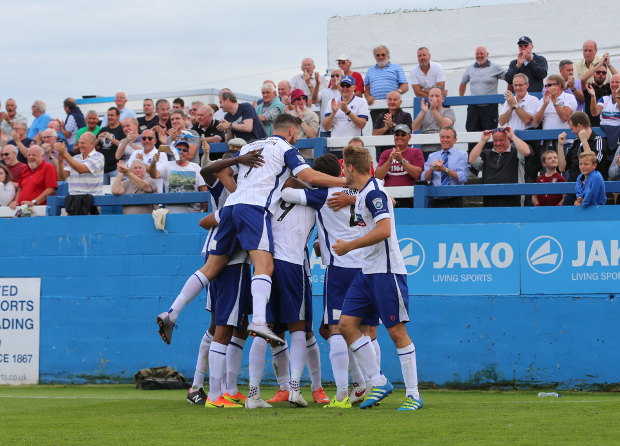Chris Dunlavy told The Non-League Paper this week that three-up from the National League must be one of the English game’s priorities to recover from the coronavirus crisis. As Non-League’s top flight considers whether to restart the season or expunge all results and consign the 2019/20 campaign to the dustbins of history, Dunlavy looks to history for lessons before this Sunday’s NLP hits newstands, in print and online…
What cracked the Football‘s League’s stubborn refusal to grant the Conference an extra promotion place in 2002 was not lobbying, ethics, or a sense of fairness. It was a catastrophe. A decade of campaigning had fallen on deaf ears. So, too, pressure from local MPs, the FA and even government ministers.
“We need to be more aggressive. We need supporters to unite. It is plainly obvious that the clubs and chairmen negotiating committee will not bring about more promotion places.” Turner was right. But it was not a change of tactics that tipped the balance. It was the collapse of ITV digital.

In June 2000, the broadcaster signed a suicidal £315m three-year deal to cover the Football League from the start of 2001-02. The figure was based on a ludicrous overvaluation of the product and, when subscriptions flatlined, ITV Digital faced ruin. By March 2002, the cupboard was bare. The EFL was offered just £50m for the final two seasons of the deal, a reduction of £129m. They sued, lost, and were ultimately left with nothing when ITV Digital went under.
Directives
Unfortunately, many clubs had already spent the money. This placed the FA – a vocal advocate of two-up, two-down – in an unexpectedly advantageous position. Having previously demanded eye-watering sums in exchange for doubling their chance of relegation, Division Three sides suddenly had to take what they could get. The FA offered each of them £50,000 a year over five seasons and the deal was sealed.
Non-League sides are vulnerable. Barnet have already admitted job losses are likely and many more will follow suit. But for those who cling on, there is also a rare opportunity. England’s elite clubs are determined to finish the season, probably in June or July. Yet there is no guarantee that social distancing directives will be relaxed by ten, nor that players will be fit and healthy. In the lower leagues, too, most contracts expire on June 1.
So what then? One option mooted by the Premier League – and likely to be adopted by several European countries – is to scrap the season, abandon relegation and promote only those in the automatic placings. This would see the Premier League run with 22 team in 2020-21. Leeds United and West Bromwich Albion would be promoted, with five teams relegated from the top flight at the end of the season to restore the status quo.
Incentive
The two vacant spaces in the Championship would presumably be taken by those currently in League One’s two automatic places. As it stands, that is Coventry and Rotherham United. In League Two, there are three automatic promotion places, a situation that might have posed a problem in any previous season. Fortuitously, however, the demise of Bury means there is space for one extra team in League One.
This, of course, leaves three vacancies at the bottom of League Two. By the time any such measure is decided, every fourth tier club is likely to be, for want of a better term, on the bones of their a***. Can they afford to run a team light for 12 months? It may not seem like much but, for a club like Macclesfield or Morecambe, one home game’s revenue can be the difference between staff getting paid or laid off.
“Three-up, three down will always be our ambition,” said National League chief executive Michael Tattersall in 2018. “But there’s got to be an opportunity. The other powers-that-be have to see there is a reason for it.” There may never be a better one.
Make sure you get your copy of The Non-League Paper on Sunday for all the latest news over the last seven days in one place on the impact of the coronavirus crisis on society and football’s fightback.
It’s also available from midnight on Saturdays as a pound-busting digital edition and full replica of the printed paper. Why wait!
Images courtesy of The Non-League Paper






















